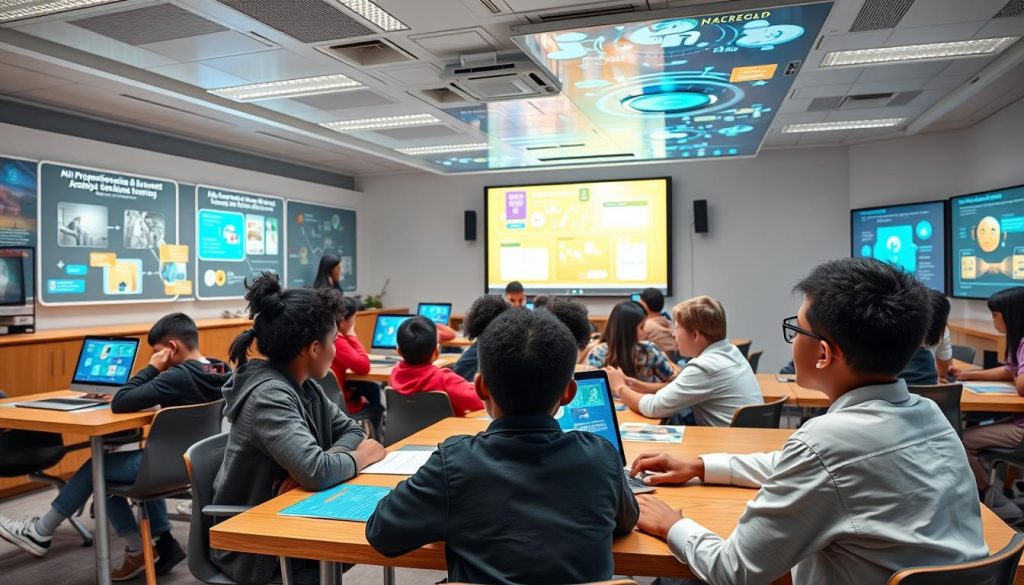Structured AI coaching significantly improves high school STEM teachers' perceptions of artificial intelligence as a powerful tool for fostering equity and inclusion in their classrooms.
Objective: The primary purpose of this qualitative multiple case study was to investigate how structured AI coaching influences high school teachers' perceptions of artificial intelligence as a tool for fostering equity and inclusion in K-12 classrooms. The study aimed to examine how school culture, leadership dynamics, and individual agency shape AI adoption, while empowering teachers to become transformational leaders who can guide their peers in integrating AI tools for equitable educational practices. Additionally, the research sought to bridge the gap between AI technology and practical classroom application through targeted professional development and peer coaching approaches.
Methods: This qualitative multiple case study employed Robert K. Yin's comprehensive framework, involving five STEM teachers across three Arkansas schools. The researcher served as a peer coach, conducting bi-monthly coaching cycles that modeled AI tool usage and demonstrated coaching techniques designed to empower teachers to adopt peer coaching roles within their schools. Data collection included surveys, interviews, and classroom artifacts analyzed through structured protocols. The study was grounded in three theoretical frameworks: Universal Design for Learning (UDL) for equity-focused tool selection, the Technology Acceptance Model (TAM) for understanding technology adoption, and Transformational Leadership as the guiding framework for coaching and empowerment. Teachers participated in 30-40 minute sessions where they were introduced to free AI tools designed to enhance equity-oriented technology integration practices, supported by short 2-5 minute instructional videos. The coaching approach was collaborative and non-threatening, focusing on practical application and gradual confidence building.
Key Findings: The study revealed several significant outcomes regarding AI integration in educational settings. Supportive leadership and clear instructional alignment emerged as critical factors in improving teachers' perceptions of AI tools. Teachers who received structured coaching demonstrated increased confidence in using AI for creating differentiated content, supporting diverse learners including students with disabilities and English Language Learners, and streamlining administrative tasks. The findings showed that transformational leadership principles, when integrated into coaching processes, effectively equipped teachers with skills and confidence necessary to lead AI integration efforts and mentor others. Participants reported that AI tools helped them address long-standing challenges in creating inclusive learning environments, particularly in STEM classrooms where persistent inequities often hinder progress. The coaching model successfully empowered teachers to view themselves as change agents capable of fostering innovation and supporting peers in embracing technology that enhances student learning. School culture emerged as a crucial factor, with environments that supported risk-taking and innovation showing greater success in AI adoption.
Implications: This research contributes significantly to the field of AI in education by demonstrating the critical importance of targeted professional development and leadership support in promoting equitable, inclusive technology integration. The findings provide practical implications for professional development programs and school leadership, emphasizing the need for tailored support that aligns with teachers' needs and promotes equity-focused innovation. The study highlights how AI tools, when implemented thoughtfully through structured coaching, can enhance differentiation, streamline administrative tasks, and support equitable practices. For policymakers, the research underscores the importance of investing in professional development programs that incorporate coaching on technology integration as a means of promoting equity. The work positions STEM educators as change agents in their local contexts, demonstrating AI's potential to bridge equity gaps in education and foster more inclusive teaching practices. The study contributes to the growing body of research on equity-centered technology integration and provides evidence that coaching and targeted AI tools can empower educators to create inclusive classrooms.
Limitations: The study acknowledges several important limitations that affect generalizability and interpretation of findings. The qualitative multiple case study design, while providing rich insights, limits the ability to establish causal relationships or broad generalizability beyond the specific contexts studied. The researcher's dual role as both coach and researcher may have influenced participants' responses, potentially leading to socially desirable feedback rather than completely authentic perceptions. The study was conducted with only five STEM teachers across three Arkansas schools, representing a small sample size that may not reflect the diversity of educational contexts, teacher experiences, or regional variations in technology adoption and school culture. The focus specifically on high school STEM teachers may limit applicability to other subject areas or grade levels. Additionally, the study measured perceptions and attitudes rather than actual learning outcomes or long-term implementation success, leaving questions about the sustained impact of the coaching intervention on classroom practices and student achievement.
Future Directions: The researcher recommends several critical areas for future investigation to build upon these findings. Longitudinal studies are needed to examine the sustained impact of AI coaching on teachers' classroom practices and student learning outcomes over extended periods. Research should expand to include larger, more diverse samples across different geographic regions, grade levels, and subject areas to establish broader generalizability. Future studies should investigate optimal coaching models and duration, comparing different professional development approaches to determine most effective strategies for AI integration. Researchers should examine the relationship between AI integration and actual student achievement, particularly for historically marginalized populations. Studies exploring the role of administrative support and school culture in facilitating successful AI adoption would provide valuable insights for implementation. Additionally, research should investigate the development of teacher leadership capacity through AI coaching and how this translates to school-wide innovation and peer mentoring. Future work should also address ethical considerations and potential biases in AI tools, ensuring responsible integration that truly supports equity and inclusion.
Title and Authors: "Teacher-Led Innovation: Transformative Leadership in the Era of AI-Influenced Education" by Kayla Waters.
Published On: August 2025
Published By: A dissertation presented to the Department of Leadership Studies and the Graduate School of the University of Central Arkansas in partial fulfillment of the requirements for the degree of Doctor of Philosophy, Major: Change Leadership for Equity and Inclusion
